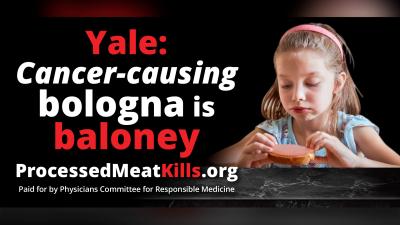Processed Meat
There Is No Safe Amount of Processed Meat
Processed meat increases the risk of colorectal cancer, cardiovascular disease, and even early death.
Processed meat includes meat products that have been cured, smoked, or salted, or have had preservatives added to change the taste and texture, or to extend the shelf life. This includes meat products such as hot dogs, bacon, deli meats, and jerky.
Cancer
Colorectal cancer (CRC) is on the rise in young men and women in the United States, according to the American Cancer Society’s 2024 annual report.1 CRC has risen to the leading and second-leading cause of cancer death in men and women, respectively, aged 40-49 years in 2021. CRC also moved up to the leading cause of cancer death in men aged 20-39 years and the third leading cause in women in the same age group following breast and cervical cancer.
The World Health Organization (WHO) has determined that processed meat is a major contributor to colorectal cancer, classifying it as “carcinogenic to humans”.2 30 grams of processed meat, which is just one hot dog or a few strips of bacon, consumed daily increases cancer relative risk by 18%.3 The World Cancer Research Fund and the American Institute for Cancer Research have also found that “the evidence on processed meat and cancer is clear-cut.”4
“Processed meat refers to meat that has been transformed through salting, curing, fermentation, smoking, or other processes to enhance flavor or improve preservation. Most processed meats contain pork or beef, but processed meats may also contain other red meats, poultry, offal, or meat by-products such as blood. Examples of processed meat include hot dogs (frankfurters), ham, sausages, corned beef, and biltong or beef jerky as well as canned meat and meat-based preparations and sauces.”
– WHO
There are several cancer-causing compounds (carcinogens) found in processed meats, which include N-nitroso compounds (NOCs) in cured meats, heterocyclic aromatic amines (HAAs) that are formed when meat is well cooked, and polycyclic aromatic hydrocarbons (PAHs) that form when meat is smoked or cooked on an open flame. These compounds damage the DNA in the cells lining our colon, which can lead to the development of cancer cells and over time the growth of large tumors.5 Heme iron, the form of iron found in animals and animal products, has also been linked to causing damage to DNA which increases the risk of cancer cells forming.5
The bacteria in our gut may also play a role. There are trillions of bacteria that live in our intestines, and these bacteria and their metabolites affect our colon cells. Research has found that dysbiosis (an imbalance between health-promoting and disease-promoting bacteria) as well as certain strains of bacteria are associated with an increased risk of colorectal cancer by causing inflammation in the gut and interacting with genes in the colorectal cells to promote tumor growth.6
CRC isn’t the only cancer risk that comes from consuming processed meat. Eating 50 grams of processed meat daily also increases the risk of prostate cancer, pancreatic cancer, and overall cancer mortality.7 One meta-analysis found that every 50 grams of processed meat eaten per day increased the relative risk of stomach cancer by 72%.8 And a study of more than 200,000 women found that eating about 20 grams of processed meat each day—less than half the size of a regular hot dog—increased breast cancer relative risk by 21%.9 Processed meat may also increase the risk of rarer forms of cancer such as non-Hodgkin’s lymphoma, bladder cancer, and cancer of the mouth.10
Cardiovascular Disease
Processed meat is linked to cardiovascular disease and death, according to a study that found people eating more than 150 grams (about 5.29 ounces) of processed meat per week increased their risk of heart disease and death by 46% and 51%, respectively, when compared to those who did not eat processed meat.11 And a meta-analysis of 43 studies on heart disease found a 26% increased risk of heart disease for 50 grams of processed meat consumed.12
There are various ways that eating processed meat can increase the risk of heart disease. The most important risk factor is the saturated fat found in red and processed meat, which increases LDL cholesterol in our blood. Elevated LDL cholesterol results in the buildup of plaque in arteries around the body, classified as heart disease when this occurs in the arteries supplying blood to the heart. The compounds found in processed meat that increase the risk of cancer (mentioned above) result in chronic inflammation in the body, which contributes to the development of heart disease. Salt, a common preservative used in processed meat production, increases the risk of high blood pressure, another risk factor for cardiovascular disease.13
Processed meat is also associated with an increased risk of having a stroke for these reasons.14 An umbrella review of 40 studies found that consuming just 50 grams of processed meat per day was associated with a 15% increased risk of stroke.15
Eating a hot dog takes away 36 minutes of healthy life (good-quality and disease-free life) according to a study that evaluated more than 5,800 foods and ranked them by their nutritional disease burden.16
Type 2 Diabetes
Eating 50 grams of processed meat per day is associated with a 27-51% increased risk of developing type 2 diabetes.17-18 The saturated fat, heme iron, nitrates, and advanced glycation end-products found in processed meat all contribute to the increased risk of type 2 diabetes and insulin resistance. To read more about this, visit our Diabetes page.
Since we know that processed ones are a Group 1 carcinogen, it pays to avoid bacon, hot dogs, and other processed meat. Swap them out for healthy, plant-based options that will reduce your cancer risk instead of increasing it.
Anna Herby, DHSc, RD, CDE
Plant-Powered Prescription for Processed Meat
- Eliminate processed meat from your diet.
- Instead of hot dogs, try carrot dogs or veggie dogs.
- There are plant-based alternatives for almost every type of processed meat these days, or simply leave out the meat and fill your plate with legumes, whole grains, vegetables, and fruits.
Break Up With Bacon
Hard-Hitting TV Ad Targets Cancer-Causing Bacon in 18 States Most Impacted by Colon Cancer Deaths
Dr. Barnard: Processed Meats Cause Colorectal Cancer
Just one hot dog or a few strips of bacon consumed daily increases cancer risk by 18 percent.
Wise Beyond Her Years
Processed meats cause colorectal cancer, and rates are rising among young people.
Further Reading
DID YOU KNOW?
Beans and other high-fiber foods satisfy hunger more than meat.
References
- Dizon DS, Kamal AH. Cancer statistics 2024: all hands on deck. CA Cancer J Clin. 2024. doi:10.3322/caac.21824
- World Health Organization International Agency for Research on Cancer. IARC monographs evaluate consumption of red meat and processed meat. October 26, 2015. Accessed February 12, 2024. https://www.iarc.who.int/wp-content/uploads/2018/07/pr240_E.pdf
- Farvid MS, Sidahmed E, Spence ND, Mante Angua K, Rosner BA, Barnett JB. Consumption of red meat and processed meat and cancer incidence: a systematic review and meta-analysis of prospective studies. Eur J Epidemiol. 2021;36(9):937-951. doi:10.1007/s10654-021-00741-9
- World Cancer Research Fund International. Limit red and processed meat. Accessed January 8, 2024. https://www.wcrf.org/diet-activity-and-cancer/cancer-prevention-recommendations/limit-red-and-processed-meat/
- Turesky RJ. Mechanistic evidence for red meat and processed meat intake and cancer risk: a follow-up on the International Agency for Research on Cancer Evaluation of 2015. Chimia (Aarau). 2018;72(10):718-724. doi:10.2533/chimia.2018.718
- Abu-Ghazaleh N, Chua WJ, Gopalan V. Intestinal microbiota and its association with colon cancer and red/processed meat consumption. J Gastroenterol Hepatol. 2021;36(1):75-88. doi:10.1111/jgh.15042
- Wolk A. Potential health hazards of eating red meat. J Intern Med. 2017;281(2):106-122. doi:10.1111/joim.12543
- Kim SR, Kim K, Lee SA, et al. Effect of red, processed, and white meat consumption on the risk of gastric cancer: an overall and dose-response meta-analysis. Nutrients. 2019;11(4):826. doi:10.3390/nu11040826
- Anderson JJ, Darwis NDM, Mackay DF, et al. Red and processed meat consumption and breast cancer: UK Biobank cohort study and meta-analysis. Eur J Cancer. 2018;90:73-82. doi:10.1016/j.ejca.2017.11.022
- Huang Y, Cao D, Chen Z, et al. Red and processed meat consumption and cancer outcomes: Umbrella review. Food Chem. 2021;356:129697. doi:10.1016/j.foodchem.2021.129697
- Iqbal R, Dehghan M, Mente A, et al. Associations of unprocessed and processed meat intake with mortality and cardiovascular disease in 21 countries [Prospective Urban Rural Epidemiology (PURE) Study]: a prospective cohort study. Am J Clin Nutr. 2021;114(3):1049-1058. doi:10.1093/ajcn/nqaa448
- Shi W, Huang X, Schooling CM, Zhao JV. Red meat consumption, cardiovascular diseases, and diabetes: a systematic review and meta-analysis. Eur Heart J. 2023;44(28):2626-2635. doi:10.1093/eurheartj/ehad336
- Filippini T, Malavolti M, Whelton PK, Vinceti M. Sodium intake and risk of hypertension: A systematic review and dose-response meta-analysis of observational cohort studies. Curr Hypertens Rep. 2022;24(5):133-144. doi:10.1007/s11906-022-01182-9
- Kim K, Hyeon J, Lee SA, et al. Role of total, red, processed, and white meat consumption in stroke incidence and mortality: a systematic review and meta-analysis of prospective cohort studies. J Am Heart Assoc. 2017;6(9):e005983. doi:10.1161/JAHA.117.005983
- Zhang X, Liang S, Chen X, et al. Red/processed meat consumption and non-cancer-related outcomes in humans: umbrella review. Br J Nutr. 2023;130(3):484-494. doi:10.1017/S0007114522003415
- Stylianou KS, Fulgoni VL 3rd, Jolliet O. Small targeted dietary changes can yield substantial gains for human health and the environment. Nat Food. 2021;2(8):616-627. doi:10.1038/s43016-021-00343-4
- Zhang R, Fu J, Moore JB, Stoner L, Li R. Processed and unprocessed red meat consumption and risk for type 2 diabetes mellitus: an updated meta-analysis of cohort studies. Int J Environ Res Public Health. 2021;18(20):10788. doi:10.3390/ijerph182010788
- Micha R, Michas G, Mozaffarian D. Unprocessed red and processed meats and risk of coronary artery disease and type 2 diabetes--an updated review of the evidence. Curr Atheroscler Rep. 2012;14(6):515-524. doi:10.1007/s11883-012-0282-8











